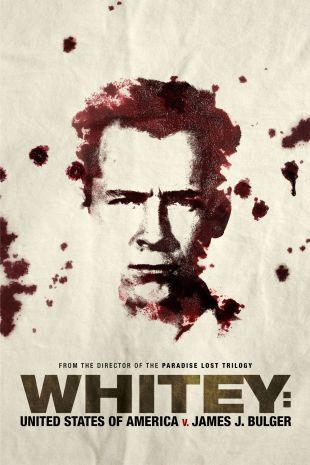
Two indelible images dominate the first few minutes of Joe Berlinger's crime-themed exposé Whitey: United States of America v. James J. Bulger. In the first, interviewee Stephen Rakes sits before the camera, voice trembling, and recalls with palpable horror and fear the afternoon when Boston gangster James "Whitey" Bulger and a henchman from Bulger's Winter Hill Gang knocked on the door of his home and promised to slay him unless he agreed to give them regular returns from the South Boston convenience store that he owned. The second image turns up when Berlinger places stills of all of Bulger's confirmed victims on the screen, and then scrolls past them. One face in particular catches our attention: a professional studio headshot of the late Debra Davis, a pretty, wide-eyed blonde who looks like she could be the homecoming queen at the local high school. Berlinger uses moments such as these to remind his viewers that hoods like Bulger aren't as removed from society as many of us would like to believe. Instead, they routinely infect, and in some cases destroy, the lives of ordinary, well-meaning men and women. The other purpose is a deflation of the public perception of the Mafia engendered by movies and television, in which organized-crime figures are often portrayed as mythical, romantic antiheroes; Berlinger wants us to know, up front, that individuals such as Bulger are not to be admired. In real life, they are ruthless, amoral, psychopathic vermin, swarming through our streets and neighborhoods and overtaking our cities.
Although we do get a few sequences of biographical exposition, the movie as a whole doesn't chronicle Bulger's life from birth to incarceration. Instead, it mostly takes place during the months leading up to his trial. Berlinger slips into sleuthing mode and uses screen time for an epic-length dissection of the federal law-enforcement agencies that had ties to Bulger. The film argues that, although the media and public saw him as an arch criminal hiding behind the Federal Witness Protection program while carrying out his illicit activities sub rosa, the truth was far more nefarious: The FBI remained fully aware of most of Bulger's exploits, but turned its back and did nothing because it was using him as an inside man to bring down the five major Italian-American crime families.

This is one hell of a claim, but as we've come to expect from Berlinger's prior work, he makes his case with a convincing and effective hand as he unveils the truth about one government agent and Winter Hill Gang member after another. In a review of this length, it would be foolhardy (and close to impossible) to attempt to catalogue all of the malfeasance that the director details onscreen as he excoriates such Bulger associates as FBI agents John Morris and John Connolly. The impression that we take away from the documentary, though, is one of sprawling, multilayered corruption and criminality at just about every level of federal law enforcement. Watching the film unfold, you can't help but wonder how many excruciating months Berlinger had to spend with the legal department, given all of the bigwigs he skewers here.
Some of the most fascinating implications of the documentary arise between the lines -- so subtly that you have to look quickly to avoid missing them. In particular, the shocking death of one interviewee mid-film is never fully explained or accounted for; he abruptly perishes from cyanide poisoning in his coffee, and the law concludes, somewhat ominously and unconvincingly, that this homicide had no connection to Bulger. And when one key witness suddenly refuses to testify in court, we feel a shimmer of chilly paranoia that gives us the impression that there may be more transpiring under the surface than meets the eye.

The movie's evenhanded castigation of everyone and everything (aside, of course, from the victims and their relatives) is a double-edged sword. On the one hand, it may be the singular element that prevents the film from actually being enjoyable (as opposed to simply admirable). Other muckraking documentaries, such as Alex Gibney's We Steal Secrets: The Story of Wikileaks, are delightful because of their tonal ambiguity: You feel tugged back and forth between sympathy and repulsion, and are ultimately left unsure of how to resolve your contradictory feelings. Here, you walk away feeling bilious and angry, convinced that the whole world is scummy, depraved, and hopeless. At the same time, though, the film has so much to recommend it. You're awestruck not only by the breadth of the central revelations, but by the director's ability to successfully lead his audience through a byzantine series of names and facts without becoming confusing or tedious, and by the audacity and credibility of the conclusions that materialize onscreen. Minor reservations aside, the film's top-notch craftsmanship and investigative bravado must qualify it as some kind of masterpiece.
